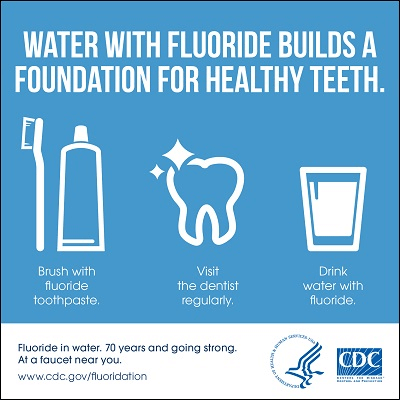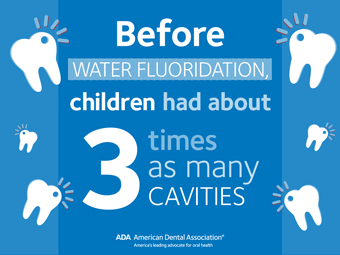 I recently had a discussion with a friend of mine as I gave my son his daily fluoride drops. After I was done, my friend looked at me with a puzzled expression and asked me why I would give my son fluoride because she had heard that fluoride is toxic. As a dentist, I hear this view fairly often and it’s frustrating because I immediately want to start presenting all the research touting the major benefits of fluoride supplements in children without coming off as overbearing. In my friends’ case, I very confidently answered her that I was doing my son a favor by giving him fluoride supplements to reduce his future risk for tooth decay because our local drinking water is not fluoridated. Because this is such a common concern, I’d like to take a moment to further explain myself and offer a few points for parents of young children to consider.
I recently had a discussion with a friend of mine as I gave my son his daily fluoride drops. After I was done, my friend looked at me with a puzzled expression and asked me why I would give my son fluoride because she had heard that fluoride is toxic. As a dentist, I hear this view fairly often and it’s frustrating because I immediately want to start presenting all the research touting the major benefits of fluoride supplements in children without coming off as overbearing. In my friends’ case, I very confidently answered her that I was doing my son a favor by giving him fluoride supplements to reduce his future risk for tooth decay because our local drinking water is not fluoridated. Because this is such a common concern, I’d like to take a moment to further explain myself and offer a few points for parents of young children to consider.
So, what is fluoride and why would I give it to my child? What are the plusses and negatives of fluoride consumption? Fluoride is a naturally occurring element that can be found in trace amounts in water sources, some foods and many oral healthcare products. In fact, if you drink tea, you’re probably consuming fluoride and you don’t even know it!
To address my friend’s concerns – yes, fluoride can be toxic at high levels and if you or your child consume too much of it, too quickly, this can lead to a serious medical condition. But, toxicity is a funny thing. Many things such as medications are toxic at high levels and should receive the same warning. Advil, for instance, is a compound known to be toxic to the liver in high concentrations and should be taken as directed. Even table salt contains sodium and chloride; both essential for biologic function but also extremely toxic at high levels. Rest assured, the recommended dosing of fluoride in children is well studied and is far below its toxic level when used as directed.
The most common downside to fluoride consumption is a condition called fluorosis which is a condition that results in white spots in your teeth and bones. This can occur if you are swallow too much fluoride from too many sources such as toothpaste and mouth rinse. However, the fluorosis effect has been accounted for and in 2010, caused the American Dental Association to revise their dosing recommendations lower than they previously had been.
 On the other hand, dental decay is endemic and is a very serious health concern that many children and adults face. Dental decay can lead to pain and premature tooth loss and can be debilitating to many children and adults alike. Yet fluoride consumed as a child brings down that persons’ lifelong risk for dental decay in their permanent teeth. Simply put, a child who orally consumes fluoride at the recommended levels, results in fluoride integrating into that child’s adult teeth as they develop which helps reduce future risk for tooth decay – certainly a major benefit to that child as they age.
On the other hand, dental decay is endemic and is a very serious health concern that many children and adults face. Dental decay can lead to pain and premature tooth loss and can be debilitating to many children and adults alike. Yet fluoride consumed as a child brings down that persons’ lifelong risk for dental decay in their permanent teeth. Simply put, a child who orally consumes fluoride at the recommended levels, results in fluoride integrating into that child’s adult teeth as they develop which helps reduce future risk for tooth decay – certainly a major benefit to that child as they age.
A lot of research has been done on the benefits of fluoride consumption in children that has led many medical professionals and a handful of surgeon generals to recommend daily fluoride consumption in children. Based on extensive research, fluoride supplements are recommended by the American Dental Association for children under sixteen years of age that do not live in communities already served by fluoridated water – like Stanwood-Camano and Arlington. Additionally, if you consume bottled water or well water, you are also not consuming much, if any, fluoride.
The ADA has recommendations on what the right levels of fluoride consumption are based on age and exposure levels (0.25mg – 1.0mg a day depending on age and exposure). If you are a parent of a child under the age of sixteen, I strongly recommend you consider giving your children fluoride supplements. If you are concerned with the effects of fluoride, I would recommend you take a look at the following website: http://www.ada.org/en/public-programs/advocating-for-the-public/fluoride-and-fluoridation/fluoridation-facts. If you would like to talk about this as well as other ways to reduce you and your children’s risks for tooth decay, please give us a call to schedule an appointment – we’re here to help!
